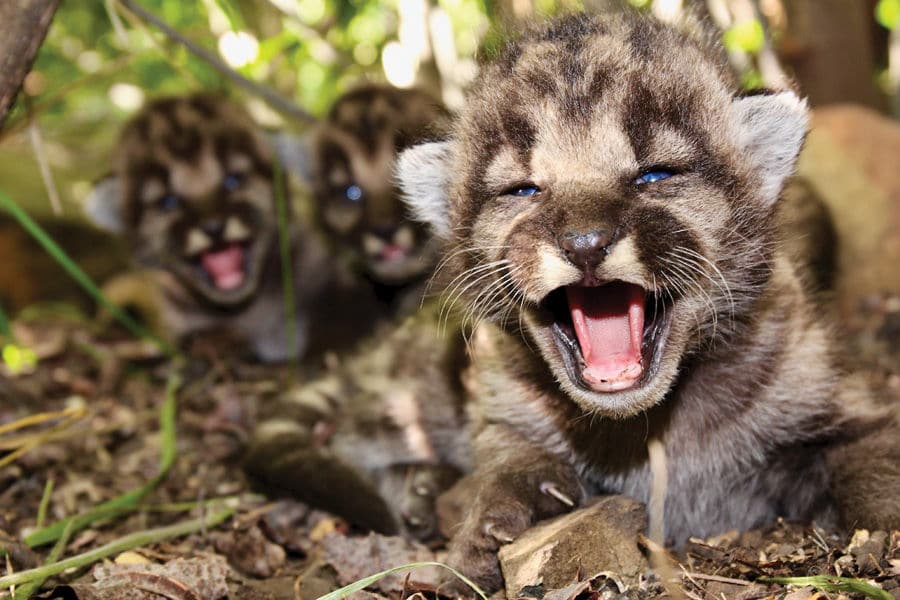Finally, there’s some good news about the mountain lions of the Santa Monica Mountains. Female P-54, a three-year-old mountain lion living in the Santa Monica Mountains, recently gave birth to a litter of three kittens—males P-82 and P-83, and female P-84, according to National Park Service (NPS) biologists. Researchers believe this is P-54’s first litter.
Biologists are hopeful that the presumed father, mountain lion P-63, may have just brought something desperately needed into the Santa Monica Mountain cougar population: genetic diversity.
It all started about four months ago when P-63, the only adult male radio-collared mountain lion living in the Santa Monica Mountains, was repeatedly pinged alongside P-54 over two days, which generally indicates mating interaction. Approximately 90 days later, researchers noticed a series of localized GPS locations indicating that P-54 was either feeding at a kill site or giving birth.
Researchers believe this may also be the first time P-63 has fathered kittens.
“The last litter of kittens that we marked at a den was from P-19, during the summer of 2018,” Jeff Sikich, a biologist that’s been studying mountain lions for Santa Monica Mountains National Recreation Area since 2002, said in a statement released by the National Park Service. “That litter was likely the product of inbreeding, which is just one of the serious problems facing the isolated mountain lion population in the Santa Monica Mountains. We’re hoping this circumstance is totally different, but only genetic testing will tell us for sure.”
Biologists visited the den after the mother left to go hunting and weighed and examined the kittens, which all appeared healthy. Each was given an ear tag for future identification purposes, and samples were taken for genetic testing. The little cougars were estimated to be 19 days old at the time.
Mother P-54 has been tracked by NPS biologists almost since she was born in January 2017, after fitting her with a tracking device while she was still a kitten.
In January 2018, P-54’s mother, P-23, was found dead near the side of Malibu Canyon Road after being struck by a vehicle. P-54 was one year old at the time of her mother’s death, which is during the early end of when kittens typically leave their mother. Fortunately, she survived.
The new litter’s likely father, P-63, wasn’t captured and radio-tagged until he was about 15 months old and still with his mother (P-62) in February 2018. Both cats were captured in the Simi Hills. Since then, P-63 has, amazingly, crossed the Ventura (101) Freeway three times without getting killed and been living in the Santa Monica Mountains since December 2018.
The lack of genetic diversity in the Santa Monica Mountains mountain lion population is caused by the fact that the mountain range is completely surrounded by freeways that the cats are seldom able to cross successfully. The mountain range is like an island, isolating the existing big cats, which some experts predict could die out within 50 years from genetic abnormalities caused by inbreeding if something isn’t done.
A wildlife crossing over the 101 Freeway in the Liberty Canyon area of Agoura Hills, still in the planning and fundraising stages, is being spearheaded by the nonprofit Save LA Cougars. The bridge would provide a connection between the small population of lions in the Santa Monica Mountains and the larger, more genetically diverse populations on the other side of the Ventura Freeway.
In April, the California Fish & Wildlife Commission voted unanimously to give local mountain lions temporary endangered species status. The vote formally advances the petition for full endangered species status under the California Endangered Species Act, which could go into effect by 2022.
Local elected officials urged the commission to take this action following the shooting death of P-56 last February, one of only two known breeding male mountain lions in the Santa Monica Mountains at the time. A Camarillo rancher was issued a “depredation permit” by the state after the cougar killed several sheep over a period of time. The shooting caused a public uproar.
Aside from inbreeding, the big cats already have a difficult enough time co-existing and surviving with humans, with many struck by vehicles and or killed by ingesting prey filled with rat poison.
Since 2002, the National Park Service has been studying mountain lions in and around the Santa Monica Mountains to determine how they survive in an increasingly fragmented and urbanized environment.

